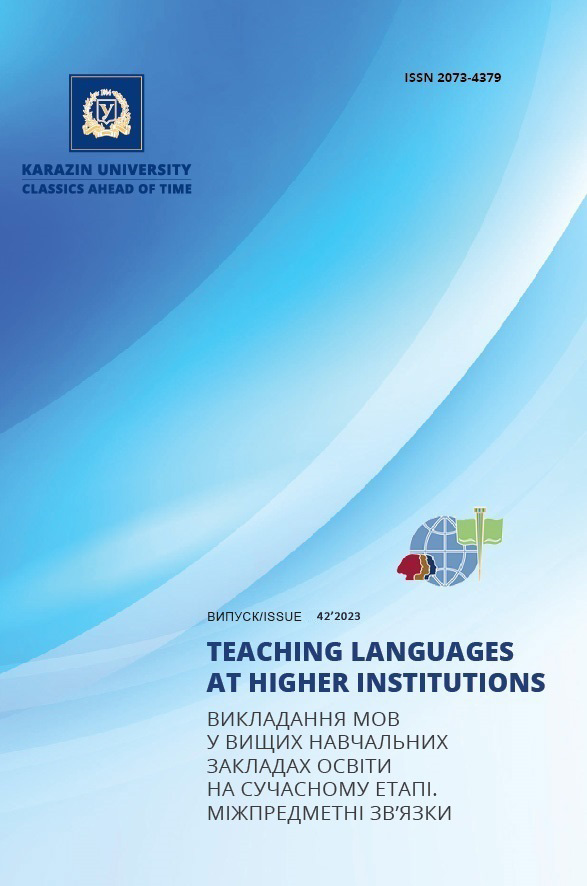Strategies for foreign students to learn special Ukrainian vocabulary
Abstract
A student studying Ukrainian as a foreign language is challenged by the difficult task of not just learning the lexical units of the language but mastering the special terminology related to a chosen specialty. The role of language teachers is also changing: more and more importance is attached to their role as moderators of the educational process. They properly organize it and promote the assimilation and application of a whole range of teaching strategies - metacognitive, cognitive, social/affective - by their students.
The objectives of this article are the analysis and development of drills that would allow students to master a specific Ukrainian vocabulary.
The authors also dwell on metacognitive strategies as methods aimed at managing cognitive activity, through which the student controls the learning process independently.
Such strategies can best contribute, on the one hand, to the most effective memorization and use of lexical units of special terminology related to the professional field, and on the other hand, help the teacher to enhance the design of the instructional material, the quality of lesson planning, and the assessment of the studentʼs knowledge.
Collaboration in the formation of the above strategies can become an effective tool for memorization with subsequent active use of the vocabulary in future professional activities. In the process of forming the strategies, the students receive a precisely formulated target orientation in their activities, which increases motivation and efficiency in mastering the professional vocabulary.
In their general conclusions, the authors note that such aspects as metacognitive, cognitive, and social strategies for reading scientific texts and the role of metalinguistic abilities in their development are insufficiently studied. Further research of the problem will continue in the direction of developing psycholinguistic aspects of diagnostics of metacognitive, cognitive, and social strategies for reading scientific texts, as well as introducing the proposed drills into the educational process.
Downloads
References
Borodina, N.S. (2013). The main classification series in Ukrainian linguistic and didactic terminology. Terminological bulletin. Kyiv: Institute of the Ukrainian Language of National Academy of Sciences of Ukraine, 2 (1), pp. 145–149 [in Ukrainian].
Vozniuk, H.L. (2010). Terminolohichna leksyka v systemi profesiinoho movlennia: Metodychni vkazivky [Terminological vocabulary in the professional speech system: guidelines]. Lviv: Vydavnytstvo Natsionalnoho universytetu “Lvivska politekhnika” [in Ukrainian].
Vakulenko, M.O. (2015). Ukrainska terminolohiia: kompleksnyi linhvistychnyi analiz [Ukrainian terminology: complex linguistic analysis]. Ivano-Frankivsk: Foliant [in Ukrainian].
Shevchenko, I.V., Kordiuk, E.M. (2018). Methods of subject-language integrated learning (CLIL) in modern methodological and scientific literature of domestic and foreign authors. Young Scientist. 4.4 (56.4), pp. 31–34 [in Ukrainian].
Dickinson, L. (1987). Self-instruction in Language Learning. Cambridge: Cambridge University Press.
Laufer, B., Rozovsky-Roitblat, B. (2014). Retention of new words: quantity of encounters, quality of task, and degree of knowledge. Language Teaching Research. Special Issue: Vocabulary Research and Pedagogy. 1 (2), pp. 1–15.
OʼMalley, J.M., Channot, A.U. (1990). Learning strategies in second language acquisition. New York: Cambridge University Press.
OʼMalley (1985). Learning strategies used by beginning and intermediate students. In Language Learning. 26 (1), pp. 17–28.
Oxford, R. (1990). Language learning strategies. What every teacher should know. Rowley, Mass.: Newbury House. pp. 284–297.
Rubin J. (1981). The study of cognitive processes in second language learning. Applied Linguistics. 1, pp. 117–131.
Schmitt, N. (2000). Vocabulary in language teaching. New York. Cambridge University Press.
Thompson, I., Rubin, J. (1996). Can Strategy Improve Listening Comprehension? Foreign Language Annuals. 29 (3), pp. 331–342. DOI: https://doi.org/10.1111/j.1944-9720.1996.tb01246.x.

